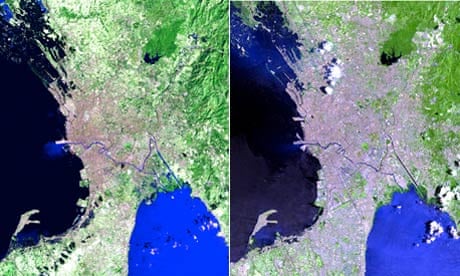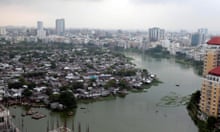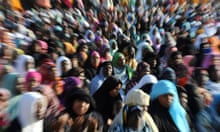A new index to measure and track the prosperity of cities has been unveiled by UN-Habitat, the UN human settlements programme, in a bid to encourage a more upbeat view of the world's rapid urbanisation.
Cities should be seen as drivers of economic growth and human development, according to the agency's flagship State of the World's Cities report, published on Wednesday at the sixth World Urban Forum (WUF) in Naples, Italy.
"A fresh future is taking shape, with urban areas around the world becoming not just the dominant form of habitat for humankind, but also the engine-rooms of human development as a whole," said the report, which called on city planners, particularly in developing countries, to see urbanisation in a positive light. In 2010 the agency announced that, for the first time, more people live in cities than in rural areas.
"Cities have been perceived as the 'engines' of national economies and there is no reason to depart from that view," said the report, pointing to numerous examples, from the US to Kenya, where urban areas contribute disproportionately to national wealth.
"A critical mass of people, ideas, infrastructure and resources acts as a magnet of development, attracting migrants, private firms, investors and developers. All of this enhances the prospects for more employment opportunities, wealth creation, innovation and knowledge, which are all major factors of prosperity."
However, the report echoed previous attempts to recalibrate measures of progress and called for a view of prosperity that goes beyond a narrow focus on economic growth.
"A lopsided focus on purely financial prosperity has led to growing inequalities between rich and poor, generated serious distortions in the form and functionality of cities, also causing serious damage to the environment – not to mention the unleashing of precarious financial systems that could not be sustained in the long run," said the executive director of UN-Habitat, Joan Clos, in a foreword to the report.
The new city prosperity index will attempt to track progress across five key issues: productivity, infrastructure, quality of life, equity, and environmental sustainability. This should help urban policymakers pinpoint problem areas, it says. Low scores on the equity component of the index, for example, push South African cities Cape Town and Johannesburg from the tier of cities with "solid" prosperity rankings to those with "weak" or "very weak" values.
"Highly unequal cities are a ticking timebomb waiting to explode," warned the report, adding that the size and quality of public space is a good indicator of a city's "shared prosperity". Urban planners must defend public spaces such as parks and pavements against the "menace of ever-expanding private interests", it argues.
Earlier this week, Clos called on national governments to adopt national urban policies to proactively manage the expansion of cities, while also handing local authorities greater power and resources. The report identified decentralisation of authority and fiscal devolution as key strategies for urban prosperity.
However, critics said UN-Habitat had failed to prioritise issues related to rights and the global housing crisis.
Raquel Rolnik, UN special rapporteur on adequate housing, said the agency had played a pivotal role in pushing a paradigm that favours the "commodification of housing, and now the takeover of housing and urban sectors by finance, its logic and structure".
Rolnik criticised the agency's new manifesto for cities, launched on Monday, for adopting the language of finance, referring to land and housing as "assets' and championing "competitive cities".
"One of the pillars of this paradigm has been the idea of 'competitive cities', entrepreneurialism, and the idea that, since states are not able to provide infrastructure and services for all, the new role of the state is as an 'enabler','" she said. "But the right to adequate housing is not the right to own a structure – four walls and a roof. The concept is an entry point to all other human rights … it has nothing to do with housing as a commodity or a good that you can buy in the market."
Activists also questioned the agency's decision not to renew the mandate of its advisory group on forced evictions, which expired in 2010. Previous UN-Habitat reports included a "secure tenure index", tracking issues related to land and housing rights. This year's report makes little mention of tenure and has no reference to the UN-declared right to adequate housing.
Organisers say 6,000 participants from 151 countries are on-site in Naples for the WUF, the world's premier meeting for city planners and urban policymakers. Held every two years, the WUF is not a decisionmaking forum, but helps inform the agenda of UN-Habitat's governing council.










